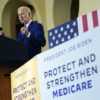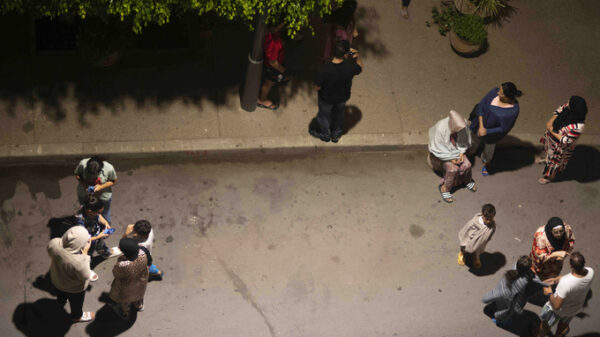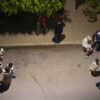A shopkeeper adjusts a jacket on a mannequin at Iran Mall shopping center in Tehran, Iran, Wednesday, June 9, 2021. The West considers Iran’s nuclear program and Mideast tensions as the most important issues facing Tehran, but those living in the Islamic Republic repeatedly point to the economy as the major issue facing it ahead of its June 18 presidential election. (AP Photo/Vahid Salemi)
TEHRAN, Iran (AP) — Almost six years ago, Iranians poured into the streets to celebrate Tehran’s nuclear deal with world powers. They saw it as a chance for the Islamic Republic to re-enter the world economy and create opportunities like purchasing airplanes and selling its oil on the international market.
Today, that dream has faded into a daily grinding nightmare of high inflation, an ever-weakening national currency and high unemployment worsened by the coronavirus pandemic.
The West considers Iran’s nuclear program and Mideast tensions as the most important issues facing Tehran, but those living in the Islamic Republic repeatedly point to the economy as the major issue facing it ahead of its June 18 presidential election.
Whoever takes the presidency after the relatively moderate President Hassan Rouhani will face the unenviable task of trying to reform Iran’s largely state-controlled economy. Efforts to privatize it have seen corruption allegations swirl as many lose their life savings and nationwide protests rage.
“One day they said the nuclear deal was accepted, everyone was happy, the dollar rate went down over one day,” said Mohammad Molaei, a 50-year-old commodities trader. “Then things start to happen. Missiles are fired. The nuclear deal is bust. One tears it apart, the other burns it. Only the people lose.”
Iran’s economic freefall accelerated when then-President Donald Trump in 2018 unilaterally withdrew America from Tehran’s nuclear deal with world powers. That saw crushing sanctions target Iran, hurting its already ailing economy.
Perhaps nothing illustrates the crisis gripping Iran’s economy as well as the battering of its currency, the rial. In July 2015 amid those raucous nuclear deal celebrations, $1 bought some 32,000 rials. Today, $1 buys 238,000 rials.
The weakening of the rial has seen the value of the money Iranians hold in the bank collapse, as well as the decimation of retiree benefits. The price of milk has risen by 90%, while the cost of imported foreign goods like mobile phones and electronics has skyrocketed.
Iranians able to exchange their rials for foreign currencies have bought precious metals like gold or invested in real estate. Those property purchases have fueled a spike in housing values, pricing people out of the market.
“In the past, buying a place to live in was a dream for the people,” said Salimi, a 48-year-old man who declined to give his first name in order to speak freely with Associated Press journalists in Tehran’s Grand Bazaar. “But … unfortunately now renting a house has become a dream as well, because of the inefficiency of the officials, especially the president, who gave empty promises and deceived the people.”
Salimi added: “Why is that? Are land, housing materials and workers under sanctions?”



























